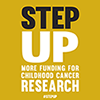In Treatment
For patients with stage I and II disease, surgery is the treatment of choice. Your doctor may wish to remove additional normal skin around the site of the biopsy depending on how deep the melanoma was. For some patients with stage II melanoma that is very deep in the skin, a sentinel node biopsy may be done and a medicine called interferon may be offered.
For patients with stage III disease, treatment usually includes a lymph node dissection followed by interferon.
If the tumor has spread to other sites, several treatments such as chemotherapy (Cisplatin, DTIC), immunotherapy (IL-2, interferon) or vaccines might be offered by your doctor.Research Studies
The majority of children with cancer participate in research studies. This high rate of participation has been essential to improving the cure rates for children’s cancer.Researchers design various studies to improve treatment and advance the understanding of cancer and its causes. Clinical trials are carefully reviewed and must be approved through a formal scientific process before anyone can be enrolled. If there is a research study “open” that your child is “eligible for,” you may be asked to allow your child to participate. It is also possible that your child will be asked to participate in more than one study.
Whether an individual is eligible for a particular study may depend on age, location of the cancer, the extent of the disease and other information. Researchers usually must limit their study to some of these characteristics to have a scientifically valid study. Further, researchers must follow exactly the same restrictions throughout the study.
If your child is eligible to participate in one or more study, your doctor will discuss these with you during an initial treatment conference (also called informed consent conference). The doctor will describe the study, potential risks of participation, and other information you need to decide whether or not you would like your child to participate in the study. You always have the choice to participate or not in research studies.
If you do choose to have your child participate in a study, you doctor will explain what type of information you will receive about the results of the study. The overall results of the research study will be published to inform the public and other researchers. No study will publish any information that identifies an individual.
Visit the Clinical Trials section of this website to learn more about the various kinds of research studies.How to Prevent Melanoma
The best treatment for melanoma is prevention. You can protect yourself and your family from melanoma by limiting the amount of sun exposure, especially between the hours of 10 AM and 4 PM as this is when the sun’s rays are the most powerful. Other tips to protect your child include:- Use a sunscreen with an SPF of 15 during any outdoor activity. When at higher elevations, use a higher SPF.
- Have your child wear a hat with a brim whenever possible to avoid sun to the most exposed part of the body – the face.
- Apply sunscreen a half hour before outdoor activity. Reapply sunscreen often.
- Avoid tanning booths.
- Examine your child’s skin regularly to identify changes. (See symptoms of melanoma)
- Be aware of medications that can make your child’s skin more sensitive to sunlight such as antibiotics, non-steroidal anti-inflammatories such as ibuprofen, certain acne medications and birth control pills.
For more information on how you can avoid sun exposure and decrease the chances of your child getting certain skin cancers visit: http://www.melanoma.com/sun_safety.html








